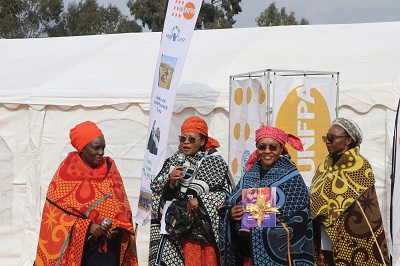By Thoboloko Ntšonyane
LERIBE – The government and the residents of Ts’ehlanyane, Leribe had in unison embraced the world population report.
Titled ‘8 billion lives, infinite possibilities, the case of rights and choices’, this report was launched last week at Leribe.
The United Nations Population Fund (UNFPA) releases an annual report of the ‘State of the World Population’. This report examines and assesses the global population including the demographic trends, and also provides insights into circumstances and challenges faced by specific regions, countries and population segments.
The United Nation (UN) Lesotho’s Resident Coordinator, Amanda Khozi Mukwashi handed over the report to the government last week.
She called out against the abuse meted out on women and girls in all its forms also expressing her “exhaustion” hearing stories of women abuse and gender based violence (GBV).
She called on the community of Leribe to respect the rights of women and girls.
The report places a premium on the rights and choices of women and girls.
The report says “all human beings have the right to make choices about when (or whether) to have children, how many children to have and with whom to have them.
“Their right to bodily autonomy means just that: free and informed choices, unhindered by requirements to live in service to any broader demographic, economic, social, political, environmental or security laws.”
The women and girls expressed their desires to be listened to and respected.
According to UN Women, the UN entity which champions gender equality and women empowerment, an estimated 736 women million globally, almost one in three have been subjected to physical and/or sexual intimate partner violence or both at least once in their lifetime.
This UN entity further shows that most violence against women is perpetrated by their current or former husbands or intimate partners. It says of those who have been in romantic relationships almost one in four adolescent girls (15-19 years) have experienced physical or sexual violence from an intimate partner.
Gender Equality Academy and Femicide Observatory Lesotho (GEAFOL), a local think-tank, says there “is [a] need to invest in masculinity transformation”.
The Child and Gender Protection Unit (CGPU) reports that from January through July 2022, there had been 184 sexual offenses and 45 assault cases against women.
As an attempt to address the GBV and femicide incidents, the parliament last year passed the Counter Domestic Violence Bill, 2021. This piece of legislation encompasses a range of measures aimed at countering domestic violence, including the provisions for stricter penalties if one is found guilty by a competent court of law and support for the victims.
One of the youth living within the Ts’ehlanyane area at Ha-Khabo, Seipati Khabo called for the enforcement of laws that will see the perpetrators be brought to book.
She said as girls and women, they have “value” adding that their rights need not be violated.
Khabo stated that as women and girls, they should enjoy their rights including the right to choose whom to engage in sexual intercourse with.
She said, it cannot only be men who should initiate sex, but also girls and women should be able to.
Also men in the area of Ts’ehlanyane pledged to protect and respect the rights of women and girls.
Amongst their pledges they committed to respect their rights to access sexual and reproductive health (SRH) services, to not be denied to attend family planning, end GBV and femicides.
Tholang Lehloba, a man residing in Ts’ehlanyane area had committed to respecting and listening to girls and women every time they voice their concerns especially on issues that affect their lives.
He talked down the practice of heteronormative patriarchal tendencies where men would make decisions without including their spouses saying that impinges on the enjoyment of women’s rights to have a voice in their families.
Lehloba said women have a right to enjoyment of being heard and listened to by their partners.
Denying women opportunity to be part of decision-making in families, he said it is tantamount to abuse.
An MP (Member of Parliament) for Pela-Ts’oeu No. 10, Hon ‘Mope Khati said gender inequality is a “very complex, societal-cultural-structural” phenomenon and to address it, deliberate efforts involving enactment of appropriate laws and their enforcement thereof.
He also pledged “to make sure that they [women and girls] get protection that they deserve”. If it has to mean involving police and the military, I will do that “.
Protecting women and girls Khati said is not a “compromise or favour” but a fundamental human right that they should enjoy.
The government had previously made a commitment to amongst others create an inclusive platform where its citizens can enjoy their fundamental human rights and flourish.
The Acting Principal Secretary at the Ministry of Finance and Development Planning, Teboho ‘Malisebo Mokela told the residents of Ts’ehlanyane that the pledges made and the pleas women and girls had made have reached the government’s “listening ears”.
She further urged them to spread awareness on the fight against GBV.
The Officer in Charge for the United Nations Population Fund (UNFPA) Lesotho, Richard Delate said they will continue to support the government in creating safe spaces for women and girls in society.
“As UNFPA, we cannot sleep lightly as long as women are dying during pregnancy in Lesotho, and neither can we sleep lightly as long as teenage girls become pregnant and are infected with HIV and in particular, we cannot sleep as long as women’s bodies continue to be violated by men in the communities and households,” he said.


